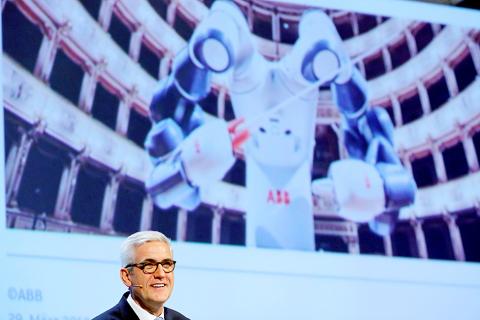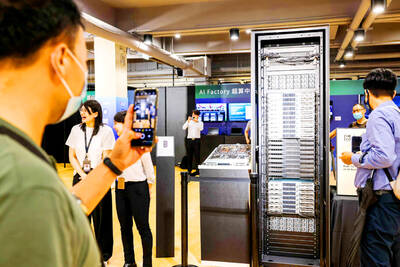Robots are to make robots at a new ABB Ltd factory in China, which the Swiss engineering group on Saturday said it plans to build in Shanghai for US$150 million as it defends its place as the country’s largest maker of industrial robots.
The factory, located near ABB’s China robotics campus, is due to be operating by the end of 2020 and is to produce robots for China, as well as for export elsewhere in Asia.
China is ABB’s No. 2 market after the US.

Photo: Reuters
“Shanghai has become a vital center for advanced technology leadership — for ABB and the world,” ABB chief executive Ulrich Spiesshofer said in a statement.
With the expansion, ABB is banking on Chinese robots sales defying concerns over trade tensions with the US, which some fear could dent demand for electronics, auto parts and other items that require automated manufacturing and robots.
China is expanding its robotic workforce as wages for human workers rise and the country seeks to compete with lower-cost countries using greater automation.
Last year, one of every three robots sold in the world went to China, which purchased nearly 138,000 units, ABB said.
The company’ said its new 6,968m2 factory would use software meant to allow people and robots to work safely in close proximity.
The company’s YuMi robots — designed to work side-by-side with people — would also be deployed on many of the small-parts assembly tasks needed to manufacture an ABB robot, it said.
Rival Kuka AG, taken over in 2016 by China’s Midea Group Co (美的集團), has also been expanding in the country, including by building a robot park in Shunde in Guangdong Province.
ABB’s industrial robots are used to build automobiles and assemble electronic devices, among other things, and it would build robots for numerous industries at the Shanghai factory, a spokesman said.
It did not give a new employee count for the factory, but said it would boost robotics employment, which now sits at more than 2,000 ABB workers in China.

LIMITED IMPACT: Investor confidence was likely sustained by its relatively small exposure to the Chinese market, as only less advanced chips are made in Nanjing Taiwan Semiconductor Manufacturing Co (TSMC, 台積電) saw its stock price close steady yesterday in a sign that the loss of the validated end user (VEU) status for its Nanjing, China, fab should have a mild impact on the world’s biggest contract chipmaker financially and technologically. Media reports about the waiver loss sent TSMC down 1.29 percent during the early trading session yesterday, but the stock soon regained strength and ended at NT$1,160, unchanged from Tuesday. Investors’ confidence in TSMC was likely built on its relatively small exposure to the Chinese market, as Chinese customers contributed about 9 percent to TSMC’s revenue last

With this year’s Semicon Taiwan trade show set to kick off on Wednesday, market attention has turned to the mass production of advanced packaging technologies and capacity expansion in Taiwan and the US. With traditional scaling reaching physical limits, heterogeneous integration and packaging technologies have emerged as key solutions. Surging demand for artificial intelligence (AI), high-performance computing (HPC) and high-bandwidth memory (HBM) chips has put technologies such as chip-on-wafer-on-substrate (CoWoS), integrated fan-out (InFO), system on integrated chips (SoIC), 3D IC and fan-out panel-level packaging (FOPLP) at the center of semiconductor innovation, making them a major focus at this year’s trade show, according

DEBUT: The trade show is to feature 17 national pavilions, a new high for the event, including from Canada, Costa Rica, Lithuania, Sweden and Vietnam for the first time The Semicon Taiwan trade show, which opens on Wednesday, is expected to see a new high in the number of exhibitors and visitors from around the world, said its organizer, SEMI, which has described the annual event as the “Olympics of the semiconductor industry.” SEMI, which represents companies in the electronics manufacturing and design supply chain, and touts the annual exhibition as the most influential semiconductor trade show in the world, said more than 1,200 enterprises from 56 countries are to showcase their innovations across more than 4,100 booths, and that the event could attract 100,000 visitors. This year’s event features 17

Hon Hai Precision Industry Co (鴻海精密), which assembles servers for Nvidia Corp, yesterday said that revenue last month rose 10.61 percent year-on-year, driven by strong growth in cloud and networking products amid continued front-loading orders for artificial intelligence (AI) server racks. Consolidated revenue expanded to NT$606.51 billion (US$19.81 billion) last month from NT$548.31 billion a year earlier, marking the highest ever in August, the company said in a statement. On a monthly basis, revenue was down 1.2 percent from NT$613.86 billion. Hon Hai, which is also a major iPhone assembler, added that its electronic components division saw significant revenue growth last month, boosted